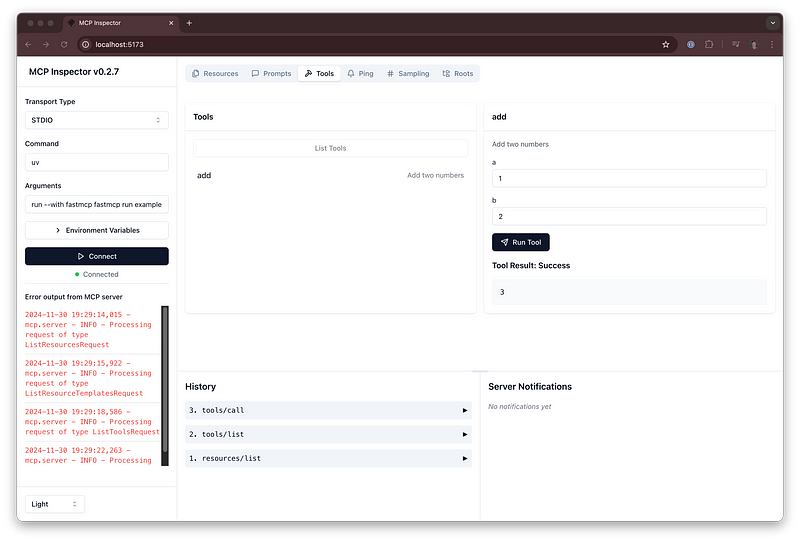- The Exit
- Posts
- 10-Minute MCP: Build Your Startup’s AI Context Server — Seriously Fast with FastMCP
10-Minute MCP: Build Your Startup’s AI Context Server — Seriously Fast with FastMCP
Are your Large Language Models (LLMs) feeling lost and confused? Spending too much time wrestling with complex integrations to get your company’s AI initiatives off the ground? You’re not alone. Many businesses are realizing the incredible potential of LLMs, but are hitting roadblocks when it comes to effectively providing them with the context and tools they need to truly shine.

Fast MCP
Are your Large Language Models (LLMs) feeling lost and confused? Spending too much time wrestling with complex integrations to get your company’s AI initiatives off the ground? You’re not alone. Many businesses are realizing the incredible potential of LLMs, but are hitting roadblocks when it comes to effectively providing them with the context and tools they need to truly shine.
Imagine trying to have a productive conversation with someone who has no background information on the topic, no access to relevant data, and no way to perform necessary actions. That’s often the reality for LLMs in many enterprise settings today.
But what if there was a better way? A standardized and efficient method to equip your LLMs with everything they need to be truly intelligent and useful for your business?
Enter the Model Context Protocol (MCP). Think of it as the missing link in your AI strategy — a revolutionary approach to providing context and tools to LLMs in a secure and structured manner. And the best part? With FastMCP, a powerful Python library, you can build your company’s MCP server in literally minutes — we’re talking closer to 10 minutes than you might think!
Yes, you read that right. 10 Minutes.
This isn’t just marketing speak. FastMCP, built upon the foundation of the Model Context Protocol (MCP) as announced by Anthropic, is designed to be incredibly user-friendly and fast, especially for Python developers. It truly lets you create an MCP server in about the time it takes to make a cup of coffee!
In this blog post, we’ll demystify MCP, explain why it’s a game-changer for businesses looking to leverage AI, and, most importantly, highlight how incredibly easy it is to create your own company MCP server using FastMCP in around 10 minutes. Get ready to ditch the integration headaches and unlock the true potential of your LLMs — faster than you ever thought possible.
What Exactly is MCP (Model Context Protocol) and Why Should Your Company Care?
Let’s break down what MCP actually is and why it’s becoming increasingly crucial for companies investing in AI, whether you are a large enterprise or a nimble startup.
Think of MCP as a universal translator for your LLMs, but instead of languages, it’s translating between the complex world of your company’s data, tools, and the needs of your AI models. In more technical terms, the Model Context Protocol (MCP) is, as described by Anthropic in their announcement, a standardized way to build servers that expose data and functionality to LLM applications in a secure and structured way.
Essentially, it’s like a web API, but specifically tailored for the unique requirements of LLM interactions. MCP servers allow you to:
Expose Data through Resources: Think of these as “GET endpoints” for your LLMs. Resources allow you to load valuable information into the context of the LLM, enabling it to access and understand relevant data. For an enterprise, this could mean connecting to vast databases of customer information or product catalogs. For a startup, it might be about providing access to key market research data or user analytics.
Provide Functionality through Tools: These are like “POST/PUT endpoints” that allow LLMs to take action. Tools enable LLMs to execute functions, interact with external APIs, and perform tasks within your systems. Enterprises can use this to let LLMs trigger complex workflows in their existing systems like CRM or ERP. Startups could leverage this to automate tasks in their lean operations, like sending customer emails or updating project management software.
Define Interaction Patterns through Prompts: Prompts act as reusable templates, guiding the LLM on how to effectively use the resources and tools you’ve exposed. This is crucial for ensuring consistent and brand-aligned interactions with AI, whether for customer-facing applications or internal tools.
Why is this profoundly beneficial for both Enterprises and Startups? Because without a robust way to provide context and tools, your LLMs are essentially operating with blinders on. MCP offers a multitude of advantages, amplified for different business stages:
Enhanced LLM Performance — For Everyone: Context is King! LLMs are powerful, but they are only as good as the information you feed them. MCP ensures your LLMs have access to the right data at the right time, allowing them to generate more accurate, relevant, and helpful outputs. Imagine a customer service chatbot that can instantly access customer history, product information, and order details — all thanks to MCP providing the necessary context. This is vital for enterprises needing reliable AI for large customer bases and for startups needing to impress early adopters with polished AI interactions.
Improved Security and Control — Especially for Enterprises: MCP provides a standardized and secure way to grant LLMs access to your internal systems and data. You control exactly what data and functionalities are exposed, minimizing security risks and ensuring compliance. This is paramount for large enterprises dealing with sensitive data and strict regulatory requirements. Startups also benefit from secure practices from day one, building trust and avoiding future security headaches as they scale.
Streamlined Integrations & Reduced Development Time — Critical for Startups: Instead of building custom integrations for every LLM application, MCP offers a universal protocol. This significantly simplifies the integration process, saving your development teams valuable time and resources. For resource-constrained startups, this speed and efficiency are game-changers, allowing them to iterate faster and get AI-powered products to market quicker. Enterprises also benefit from faster development cycles and reduced integration costs across numerous projects. And this is where FastMCP truly shines, making the process even faster and getting you to that “10-minute MCP” goal.
Future-Proofing Your AI Infrastructure — Strategic for Long-Term Growth: The Model Context Protocol is gaining momentum as a standard in the AI community, spearheaded by companies like Anthropic. By adopting MCP now, your company is future-proofing its AI infrastructure, ensuring compatibility and interoperability with future LLM technologies and applications. For enterprises, this means protecting large-scale AI investments. For startups, it means building on a future-proof foundation, avoiding technological lock-in as the AI landscape evolves.
Use Cases are Transformative for Both: Think about these scenarios where MCP can be a game-changer, tailored to different company sizes:
Intelligent Customer Service Bots: Enterprises: Deploy across massive customer service operations, integrating with complex CRM and ticketing systems. Startups: Offer premium, responsive customer service even with small teams, creating a competitive advantage.
Internal Knowledge Retrieval Systems: Enterprises: Index vast internal documentation, research reports, and legacy systems, making information accessible to all employees instantly. Startups: Centralize knowledge from day one, ensuring even new team members can quickly access crucial information in fast-paced environments.
Automated Workflow Orchestration: Enterprises: Automate complex, cross-departmental workflows, improving efficiency and reducing manual tasks across large organizations. Startups: Automate core business processes from the outset, minimizing overhead and allowing small teams to act like much larger companies.
Data Analysis and Reporting: Enterprises: Generate complex reports across massive datasets, providing data-driven insights to diverse departments and leadership. Startups: Quickly analyze market data, user behavior, and business performance to make agile decisions and pivot rapidly.
The possibilities are vast, and MCP is the key to unlocking them for businesses of all sizes. Now, let’s explore how FastMCP makes building these powerful MCP servers incredibly easy and fast — aiming for that 10-minute setup!

Built In MCP Inspector
FastMCP: Your Secret Weapon for Rapid MCP Development
So, MCP sounds great in theory, but you might be thinking, “Building servers and implementing protocols sounds complicated and time-consuming.” That’s where FastMCP comes to the rescue.
FastMCP is a Python library specifically designed to make building MCP servers and clients incredibly easy, fast, and Pythonic. It’s your secret weapon for cutting through the complexity and getting your company’s MCP server up and running in record time — remember that 10-minute goal? FastMCP is key to achieving it.
Think of FastMCP as a high-level abstraction layer that handles all the nitty-gritty details of the MCP protocol and server management. It lets you focus on what truly matters: defining your company’s unique tools, resources, and prompts, without getting bogged down in boilerplate code and protocol intricacies.
FastMCP achieves this speed and simplicity through:
Intuitive Decorator-Based Approach: Define tools and resources with simple Python decorators.
Automatic MCP Schema Generation: FastMCP handles the protocol details based on your Python code.
Built-in Server Management & Transport Handling: Easy server setup and deployment.
Comprehensive Client and Server Capabilities: Tools for both server and client-side MCP interaction.
For Python developers, FastMCP feels natural and efficient. It significantly reduces the learning curve and development effort for implementing MCP. Let’s see how quickly you can get started.

Too Easy!
Hands-On: Create Your First Company MCP Server in (Around) 10 Minutes with FastMCP — The 3-Step Quickstart
Ready to build your own MCP server? FastMCP makes it surprisingly straightforward. Here’s a simplified 3-step quickstart to get you going in around 10 minutes. For the full, detailed tutorial and code examples, please refer to the FastMCP GitHub repository and its README.
Simplified 3-Step Method:
Installation (Under 2 Minutes): Install FastMCP using
uv pip install fastmcp. See the Installation section in the FastMCP README for detailed instructions and alternative methods.Create
server.py(Under 5 Minutes): Create a Python file namedserver.pyand define your MCP server, tools, and/or resources using FastMCP decorators. A basic example is provided in the Quickstart section of the FastMCP README. You can adapt this example or create your own tools and resources.Run Your Server (Under 1 Minute): Run your server from the command line using
fastmcp run server.py. See the Running Your Server section in the FastMCP README for more options and deployment methods.
That’s it! In just these three steps, you can have a basic MCP server up and running. For more advanced configurations, adding more tools and resources, and exploring deployment options, consult the comprehensive FastMCP documentation and examples on GitHub.

Simple as 1 2 3
Going Beyond the Basics: Exploring Advanced MCP Features with FastMCP
FastMCP is not just for simple examples. It’s designed to scale and adapt to complex enterprise needs. Once you have the basics down, you can explore more advanced features to build truly powerful MCP applications.
Here’s a brief overview of some key advanced capabilities. For in-depth explanations and code examples, please refer to the FastMCP documentation (link to official docs if available, otherwise to GitHub README).
Resources for Rich Data Exposure: Expose various types of data to your LLMs using
@mcp.resource(). Explore different resource types and dynamic resource templates in the FastMCP Resource documentation (adjust link as needed).Prompts for Strategic LLM Guidance: Define reusable prompts using
@mcp.prompt()to guide LLM interactions. Learn how to create effective prompts in the FastMCP Prompt documentation (adjust link as needed).Context Object for Server-Side Power: Leverage the
Contextobject within your tools and resources for logging, progress reporting, resource access, and even client-side LLM sampling. See the Context documentation (adjust link as needed).MCP Clients for Integration and Testing: Use the
Clientclass to programmatically interact with MCP servers for testing, building client applications, or creating advanced server architectures. Explore MCP Client capabilities (adjust link as needed).Advanced Server Architectures: For complex deployments, FastMCP supports proxy servers, composite MCP applications, and even automatic server generation from OpenAPI and FastAPI specifications. Delve into Advanced Features in the FastMCP documentation
FastMCP offers a smooth learning curve, allowing you to start quickly and then progressively unlock its more powerful features as your needs evolve.

Adapt
Get Started with FastMCP and Cyberoni Today!
Ready to revolutionize your company’s AI integrations and unlock the full potential of your LLMs? FastMCP is your starting point. It makes adopting the Model Context Protocol accessible and efficient for companies of all sizes.
We encourage you to:
Explore the FastMCP GitHub Repository: https://github.com/jlowin/fastmcp — Dive into the code, examples, and detailed documentation.
Read the Comprehensive FastMCP Documentation: gofastmcp.com (link to official docs if available, otherwise to GitHub README) — Get in-depth knowledge of all features and functionalities.
Follow the 3-Step Quickstart and Experiment! Build your first MCP server and start exploring the possibilities for your company.
Cyberoni is dedicated to helping businesses succeed with AI, and we recognize the transformative potential of MCP and FastMCP. We can guide your enterprise or startup in implementing these technologies to build cutting-edge AI solutions, streamline your LLM integrations, and achieve your AI-driven business objectives.Contact us today to learn how Cyberoni can accelerate your AI journey with MCP and FastMCP.
Don’t let complex integrations be a barrier to AI innovation. With FastMCP, building a powerful MCP for your company is achievable in minutes, not months. Take the 3-step quickstart, explore FastMCP, and unlock the future of AI integration for your business!
What are your thoughts on this simplified approach to building MCP servers? What specific challenges or opportunities do you see for MCP in your industry? Share your insights and questions in the comments below!